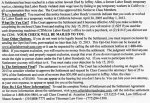Interesting to me that this comes up at this time, as I apparently was unwittingly involved in a similar case. Many years ago, I worked for an outfit called Labor Ready. Just a few weeks ago, I received a card n the mail indicating that I am to receive a small amount of money as part of a class-action lawsuit that was brought against Labor Ready. One of the issues on which this suit was based is apparently very similar to the case now being discussed against the McDonald's franchise.
When I worked for Labor Ready, we had two options for getting paid. We could either get an old-fashioned paper check, or a “voucher”, which had a number that we would enter into a cash dispensing machine (CDM) to receive our pay in cash. The check was for the full amount we were owed. The CDM would round the pay down to the last dollar, and then charge an additional dollar beyond that as a fee; so if a worker had earned $49.50 that day, he would receive $48.00 in cash, and the $1.50 would be the fee that he was charged. I nearly always took my pay as a check, which I would stop at the bank on my way home and deposit. During a brief period of time when I was having some issues with my bank, I took my pay as cash from the CDM.
I guess the issue here, as with this McDonald's case, is pay being dispensed in a way in which the worker received less than he or she is due, and by an amount that could conceivably reduce the effective pay to below the legal minimum wage.
To me, the following seems notable in this story…
Gunshannon said she asked her employer if she could receive her wages through direct deposit at her credit union, which she said did not accept payments through the payroll card.·
·
·
After she was issued a JP Morgan Chase Payroll card, she requested a paper check from her employer.
A manager allegedly told her, "If you don't activate the card, there is no way for us to pay you," according to the court complaint.
McDonald's managers and assistant managers "have the option to receive wage compensation by way of direct deposit, thus avoiding fees," the complaint states.
"McDonald's does not provide a choice for hourly employees to receive their justly earned wages through a bank check, cash or direct deposit," the lawsuit said.
The franchise was set up to be able to pay its managers through direct deposit, and Ms. Gunshannon had a credit union account which would be able to receive such direct deposits. I can see no legitimate reason at all why the franchise should not have been willing and able to pay her through this mechanism, so that she could receive her pay without being burdened by undue fees. And if they were unwilling to do that, then they should have been willing to pay her with an old-fashioned paper check, as she also requested.
I note that by comparison, in the Labor Ready case in which affects me, I had one option available to receive my pay which did not involve any fees imposed by Labor Ready, or by any other business associated therewith. Had I not had a usable bank account, I would still have been able to receive my full pay in the form of a check, and would probably have had to pay some other check-cashing business, not affiliated with Labor Ready, to cash that check. I don't know how that fee would have compared to the fee imposed by the CDM, but at least it would not, then, have been any of Labor Ready's responsibility.
I'm not certain that I agree with this principle as it applies to the Labor Ready case (though I definitely do not disagree with it enough that I am going to turn down the small amount of money that it is sending my way), but I have to say that I very much agree with this principle as it applies to the McDonald's case. Given the lack of any options to avoid the fee, or even to have the fee go to some other business than the one that the employer chose, I just cannot see this as anything other than an illegal and unethical collusion between the McDonald's franchise and the debit card issuer to cheat the employee out of part of her pay.


